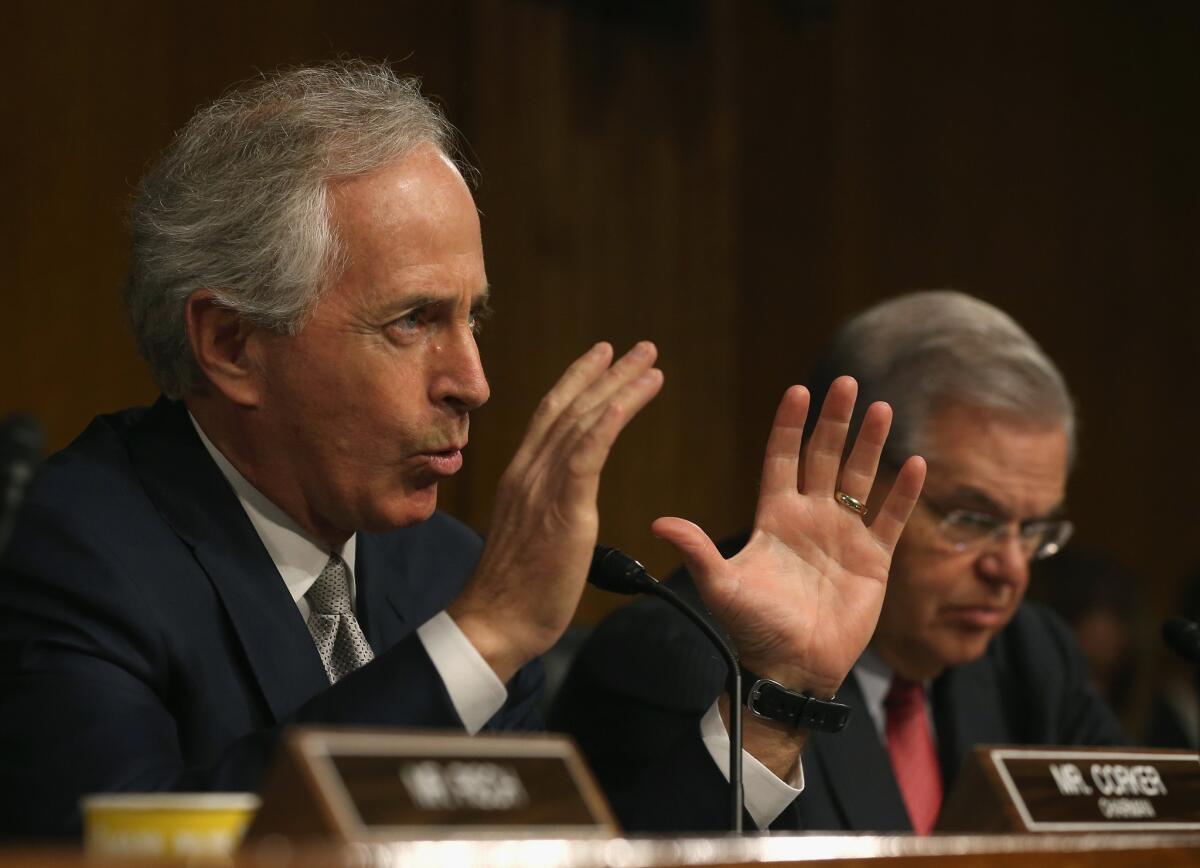As Obama defends Iran deal, GOP seeks additional details

Republican Sen. Bob Corker, chairman of the Senate Foreign Relations Committee, said Sunday of the preliminary nuclear accord reached last week with Iran, “I don’t know how anyone could really ascertain whether this is something good or bad yet for the American citizenry.” Above, Corker at a March 11 hearing.
- Share via
Reporting from Washington — With the exact details of a nuclear agreement with Iran still being debated, a prominent Senate Republican said Sunday that Congress should insist on learning more before deciding whether to support any final accord.
Sen. Bob Corker of Tennessee, chairman of the Senate Foreign Relations Committee, said he will seek the panel’s vote as early as April 14 on his proposal to prohibit President Obama from suspending economic sanctions against Iran for 60 days while Congress reviews the matter.
“Many, many details are unknown at this point,” Corker said on “Fox News Sunday.” “I don’t know how anyone could really ascertain whether this is something good or bad yet for the American citizenry.”
In an interview with the New York Times published Sunday, President Obama acknowledged that Congress might take a role in reviewing the deal, but he warned against any actions that might interfere with sensitive negotiations.
“My hope is that we can find something that allows Congress to express itself but does not encroach on traditional presidential prerogatives and ensures that if in fact we get a good deal that we can go ahead and implement it,” Obama said.
In exchange for Iran’s compliance with terms aimed at preventing its development of nuclear weaponry, a variety of sanctions imposed by the U.S. and five other world powers would be relaxed or withdrawn.
Corker — who last month declined to join 47 other GOP senators in signing a public letter to Iranian leaders that warned that the enforceability of provisions agreed to by Obama might not outlast his administration — continued Sunday to stake a more centrist position.
“This is the place for sober and thoughtful people to dig in,” he said, adding, “I want to see a negotiated agreement.”
Corker said that he had conferred three times in recent days with U.S. Energy Secretary Ernest Moniz, a nuclear scientist who participated directly in the negotiations with Iran.
Moniz, appearing Sunday on CBS’ “Face the Nation,” strongly endorsed the framework agreed to by Iran, the U.S., Germany, France, Britain, Russia and China.
He said the terms would limit Iran’s enrichment of uranium and provide international inspectors with “unprecedented access and transparency.”
“If they fail to meet any of the requirements, we are going to know,” Moniz said, adding that existing economic sanctions would be relaxed “only when they have substantially complied.”
Moniz’s enthusiasm was echoed by Benjamin J. Rhodes, a deputy national security advisor to Obama, who said on CNN’s “GPS” that, “on the merits, this is a very strong deal.”
Rhodes also pointed to what Iran might do without a final agreement, saying that the negotiated framework provided the better path forward.
“In a world of alternatives, this is the best alternative,” Rhodes said.
Additional support for the pending deal was voiced Sunday by Sen. Dianne Feinstein, (D-Calif)., who also chided Israeli Prime Minister Benjamin Netanyahu for his staunch opposition.
“I think this is the best that’s going to get done,” Feinstein said on CNN’s “State of the Union.” “It’s a better agreement, candidly, than I thought it was ever going to be.”
Feinstein, the ranking Democrat serving on the Senate Select Committee on Intelligence, added, “We’re on the cusp of something that can be workable.”
Asked about Netanyahu’s opposition, which the prime minister reiterated Sunday on ABC’s “This Week,” Feinstein said: “This can backfire on him. And I wish that he would contain himself.”
Obama said his administration remains committed to Israel’s security.
“What we will be doing even as we enter into this deal is sending a very clear message to the Iranians and to the entire region that if anybody messes with Israel, America will be there,” the president said.
More to Read
Sign up for Essential California
The most important California stories and recommendations in your inbox every morning.
You may occasionally receive promotional content from the Los Angeles Times.














